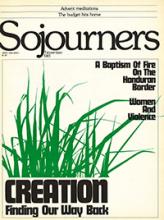You shall no more be termed
Forsaken, and your land shall no more termed Desolate;
but you shall be called My Delight is in you,
and your land Married;
for the Lord delights in you,
and your land shall be married.
For as a young man and woman wed one another,
so shall you wed the Lord who rebuilds you,
and your God shall rejoice over you as a bridegroom
and bride rejoice over each other.--Isaiah 62:4-5
I think that in view of the present distress it is well for a person to remain as he or she is. Are you bound to a wife or husband? Do not seek to be free. Are you free from a wife or husband? Do not seek marriage. But if you marry, you do not sin. Yet those who marry will have worldly troubles, and I would spare you that.--1 Corinthians 7:26-28
And a ruler asked him, 'Good Teacher, what shall I do to inherit eternal life?' And Jesus said to him, 'Why do you call me good? No one is good but God alone. You know the commandments...' And he said 'All these I have observed from my youth.' And when Jesus heard it, he said to him, 'One thing you still lack. Sell all that you have and distribute to the poor, and you will have treasure in heaven; and come, follow me.' But when he heard this he became sad, for he was very rich. Jesus looking at him said, 'How hard it is for those who have riches to enter the kingdom of God! For it is easier for a camel to go through the eye of a needle than for a rich man to enter the kingdom of God....' And Peter said, 'Lo, we have left our homes and followed you.' And he said to them, 'Truly, I say to you, there is no one who has left house or wife or husband or parents or children, for the sake of the kingdom of God, who will not receive manifold more in this time, and in the age to come eternal life.'--Luke 18:18-20a, 21-25, 28-30
Read the Full Article

